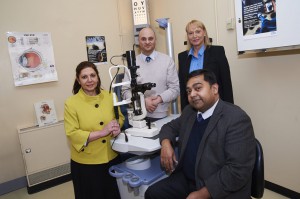 Local patients can see clearly now thanks to a new treatment offered to patients with sight impairment at Solihull Hospital.
Local patients can see clearly now thanks to a new treatment offered to patients with sight impairment at Solihull Hospital.
Following guidance by The National Institute for Health and Care Excellence (NICE) recommending the treatment, the Lucentis drug is now available at the Hospital for patients with diabetic macular oedema. Diabetics are more susceptible to developing the condition, which cannot always be treated by laser surgery.
Simon Thompson, aged 37 from Northfield, Birmingham is a patient at Solihull Hospital. Simon said: “I started noticing problems around November 2010, which was linked to having diabetic macular oedema and diabetic retinopathy. I’d received laser treatment and had various procedures to remove blood and scar tissue, but have recently started receiving the lucentis injections. So far I have had six lucentis injections in my left eye and three in my right eye and am waiting on another course in my right eye. The procedure itself is very quick and pain free and once prepped and the area cleaned only takes less than a minute for the actual injection.
“The improvements a few days after the injection was unbelievable, the improvements in my peripheral vision now means it’s a good as normal with my glasses on. My right eye once injected becomes clear to the level that I can read tiny text and can see reasonably far in the distance clearly. Before I had the injections I was worried about not being able to work as in my job as a bakery manager. I have to do a lot of paperwork and work on computer screens and was having to use a magnifying lens to read some of it. Working with food was starting to become a problem as the role requires meeting high standards of hygiene – being able to spot foreign bodies or contaminants in products became harder to do. I also have a much better standard of life with my family and am able to do simple things when playing games with my young daughter. My biggest concern when she was born was not being able to see her growing up, now the injections are making that possible.”
Mr Ramesh Sivaraj, consultant ophthalmologist and clinical director for ophthalmology at Solihull Hospital, said: “Diabetic macular oedema is a common complication associated with diabetic retinopathy and the most common cause of visual impairment in diabetics. The injection reduces the macular oedema and improves the vision. It improves the quality of life for patients who as a result can be more confident with their medication and continue to work and drive.”
The new treatment available at Solihull Hospital, Lucentis, is administered every month for three months via injection with the aid of local anaesthetic in the form of eye drops into the white of the eye. A senior nurse practitioner has been appointed by the Hospital to ensure patients consistently receive a high level of care. So far, 424 eyes have been injected since the service started at the Hospital in July 2013.






